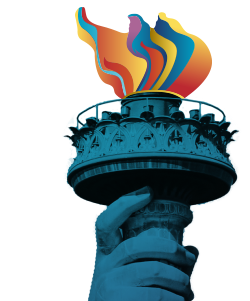One of six children, Marie Lafontant was born in Port-au-Prince, Haiti. Her father was the first family member to come to the United States, settling on Chicago’s South Side. An accountant by trade, his lack of English meant that he had to take a job at a steel mill, one of many in the area before the industry’s decline. In the early 1970s, at the age of 13, Lafontant followed her father to the United States, and was later joined by her mother and siblings. She had to learn English quickly, and worked hard to catch up with her high school classmates. Lafontant dreamed of becoming a doctor, but she also knew that that was a long process. Wanting to start work as soon as possible to assist her family financially, she decided on nursing instead. Graduating with a BA in nursing from Loyola University Chicago, she worked for Veterans Affairs and Cook County Hospital, as well as a home health nurse throughout the city and its suburbs. She then joined the University of Chicago Medical Center, where she has worked for almost 20 years. Lafontant is a registered nurse, critical care certified, with the hospital’s busy Burn Unit.
Lafontant and her Burn Unit colleagues were at the forefront of the hospital’s response to the COVID-19 pandemic, which hit full force in March. The Burn Unit was converted into a “persons under investigation” unit, where patients were tested to determine whether they had the virus before being transferred to a COVID-19 unit to begin treatment. She worked grueling 12-hour shifts under extremely difficult conditions. Despite interacting with patients who had tested positive for the virus, nurses were instructed to use less effective safety gear due to shortages in personal protective equipment such as N95 masks. Unsurprisingly, many nurses contracted COVID-19 themselves. The Burn Unit team also took on countless responsibilities that could no longer be performed by others because of the threat of contagion. They sat by the bedsides of sick patients, standing in for family members. They brought in food and fed patients. They took out the garbage. “I learned a lot about humanity, and the selflessness of others, during this crisis,” Lafontant said. “You can’t do this work alone. I have to give big kudos to my fellow nurses at the Burn Unit. We work as a team.”
In the midst of the COVID-19 crisis, nurses at Lafontant’s hospital advocated for improvements in worker safety and patient care; one of her Burn Unit colleagues even testified before the U.S House of Representatives, resulting in improvements, including an expanded supply of N95 masks for staff. Lafontant prides herself on being a “compassionate nurse.” She believes that her successes — her education, her career — would have been more difficult to achieve in Haiti. As she puts it, “The United States is a country of opportunity, where you can advance and achieve your purpose to be somebody.”
https://twitter.com/UChicagoMed







